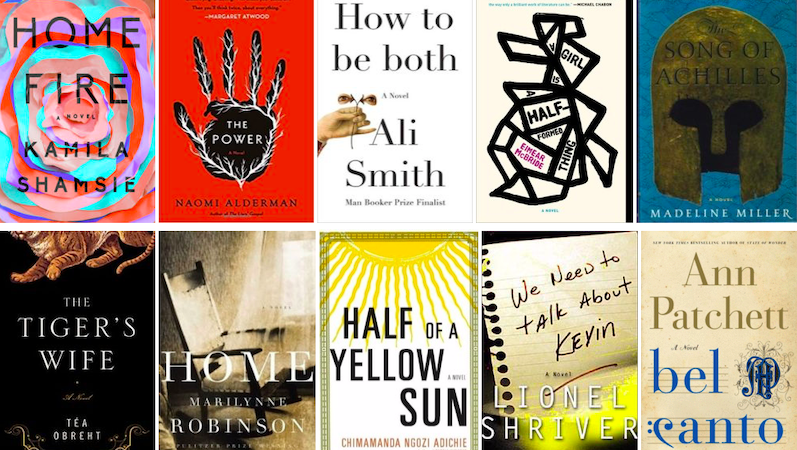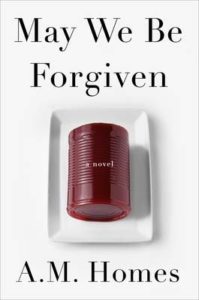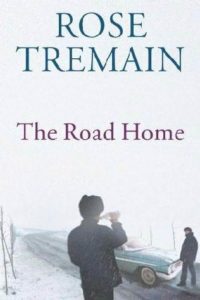
At 1:45 this afternoon, from a ceremony in London, the winner of the 2019 Women’s Prize for Fiction will be announced.
Considered to be one of the world’s most prestigious literary prizes, the award was established in 1996 “to celebrate originality, accessibility & excellence in writing by women and to connect world-class writers with readers everywhere.”
Previous winners of the £30,000 prize include Zadie Smith, Marilynne Robinson, Chimamanda Ngozi Adichie, Téa Obreht, Ann Patchett, and Barbara Kingsolver.
As we wait to see whether Pat Barker, Madeline Miller, Diana Evans, Oyinkan Braithwaite, Anna Burns, or Tayari Jones will take home this year’s award, let’s look back at the 21st century’s 19 previous winners.
*
2018
Kamila Shamsie, Home Fire
“…[an] ingenious and love-struck novel … This novel may seem to wobble in the minutes after its landing gear retracts. There are lurching shifts of tone as it moves between matters of the heart and of state. Do not panic. Order something from the drinks cart. Shamsie drives this gleaming machine home in a manner that, if I weren’t handling airplane metaphors, I would call smashing … Home Fire builds to one of the most memorable final scenes I’ve read in a novel this century.”
–Dwight Garner (The New York Times)
2017
Naomi Alderman, The Power
“Alderman has written our era’s Handmaid’s Tale, and, like Margaret Atwood’s classic, The Power is one of those essential feminist works that terrifies and illuminates, enrages and encourages … Alderman’s greatest feat is keeping this premise from settling toward anything obvious as she considers how the world would adjust if women held the balance of energy and could discharge it at will … That globe-spanning ambition could easily have dissipated the novel’s focus, but Alderman keeps her story grounded in the lives of four characters who are usually sympathetic, sometimes reprehensible … In her acknowledgments, Alderman thanks Margaret Atwood, Karen Joy Fowler and Ursula Le Guin—possibly the most brilliant triumvirate of grandmothers any novel has ever had. That lineage shows in this endlessly surprising and provocative story that deconstructs not just the obvious expressions of sexism but the internal ribs of power that we have tolerated, honored and romanticized for centuries.”
–Ron Charles (The Washington Post)
2016
Lisa McInerney, The Glorious Heresies
“The Glorious Heresies is set in the city of Cork, but banish from your mind any bucolic images you may retain from a vacation to the south of Ireland. This book occupies a cramped urban terrain of brothels, schoolboy drug dealers, grim housing estates and malicious thugs … McInerney writes an energetic, profane prose laced with the vibrant idiom of Cork street life … There’s not much of a respite for the reader in this bleak, powerful novel. A tough gallows humor pervades, but there is little in the way of redemption or hope for McInerney’s characters. In that regard The Glorious Heresies remains unstintingly true to its own subject matter.”
–Jon Michaud (The Washington Post)
2015
Ali Smith, How to Be Both
“The parallels between the two characters, and the possibility that Francescho is either some sort of guardian angel or a spirit who’s unconsciously been summoned, could seem contrived. But Smith’s deliberate obfuscation of what, exactly, is going on makes the novel feel less mawkish and more metaphysical. It’s like a mystery to be marveled at rather than solved. Her writing is crisp and elegant throughout, elevating Francescho’s anachronistic observances of 21st-century life from predictably comic to poetic … In How To Be Both, Smith manages the rare feat of conjuring up opaqueness and clarity. There are mysteries and unanswered questions, but also hints that parallels and connections abound, that everything in the world is related.”
–Sophie Gilbert (The Atlantic)
2014
Eimear McBride, A Girl is a Half-Formed Thing
“McBride’s novel is written in a dense, interrupted, shattered language, blooming with neologisms, compounds, stretched senses, old words put to new uses … When McBride’s prose is most difficult, it is because it is doubly difficult: hard to follow and hard to bear … McBride’s language also justifies its strangeness on every page. Her prose is a visceral throb, and the sentences run meanings together to produce a kind of compression in which words, freed from the tedious march of sequence, seem to want to merge with one another, as paint and musical notes can. The results are thrilling, and also thrillingly efficient.”
–James Wood (The New Yorker)
2013

A. M. Homes, May We Be Forgiven
“…by the end of this sweeping (if, sometimes, too digressive) novel, Harry fights his way out of alienation and assembles a vibrant alternative family around that holiday table. May We Be Forgiven may feature Homes’ distinctively off-beat humor and jagged storylines, but she’s a softie at heart. Her writing is strange, to be sure, but it’s also deeply imbued with that kind of It’s A Wonderful Life-type belief in redemption that we Americans will always be suckers for, and rightly so.”
–Maureen Corrigan (NPR)
2012
Madeline Miller, The Song of Achilles
“Although Achilles soon is recognized as the greatest Greek warrior, it is the story of Patroclus—as Achilles’ aide-de-camp, as his friend and lover, as a medic for the Greek army, as protector of a captive girl over whom Achilles and Agamemnon quarrel, bringing disaster upon the Greek camp—that interests Miller more. Meanwhile, Achilles, who cannot function without Patroclus’ help, remains remote and godlike. Even for a scholar of Greek literature, which Miller is, rewriting the Western world’s first and greatest war novel is an awesome task to undertake. That she did it with such grace, style and suspense is astonishing.”
–Brian Woolly (The Dallas Morning News)
2011
Téa Obreht, The Tiger’s Wife
“Téa Obreht’s stunning debut novel, The Tiger’s Wife, is a hugely ambitious, audaciously written work that provides an indelible picture of life in an unnamed Balkan country still reeling from the fallout of civil war … It’s not so much magical realism in the tradition of Gabriel García Márquez or Günter Grass as it is an extraordinarily limber exploration of allegory and myth making and the ways in which narratives reveal—and reflect back—the identities of individuals and communities: their dreams, fears, sympathies and hatreds … As Ms. Obreht parcels out chapters of these two fables, she gives us vivid portraits of Gavo, the tiger’s wife and other fairy-tale-like characters. By peopling The Tiger’s Wife with such folkloric characters, alongside more familiar contemporary types, Ms. Obreht creates an indelible sense of place.”
–Michiko Kakutani (The New York Times)
2010
Barbara Kingsolver, The Lacuna
“How can the experiences of a fictional loner merge with those of larger-than-life figures who played a pivotal role in world politics? And what can readers learn from their intersection? Those are the questions answered by this dazzling novel, which plunges into Shepherd’s notebooks to dredge up not only the perceptions they conceal but also a history larger than his own, touching on everything from Trotskyism, Stalinism and the Red scare to racism, mass hysteria and the media’s intrusion into personal and national affair … The Lacuna can be enjoyed sheerly for the music of its passages on nature, archaeology, food and friendship; or for its portraits of real and invented people; or for its harmonious choir of voices. But the fuller value of Kingsolver’s novel lies in its call to conscience and connection. She has mined Shepherd’s richly imagined history to create a tableau vivant of epochs and people that time has transformed almost past recognition.”
–Liesl Schillinger (The New York Times Book Review)
2009
Marilynne Robinson, Home
“Robinson moves beautifully into and out of Glory’s thoughts; indeed, she works almost as if Glory were a first-person subject. We never enter the mind of another character, but from dialogue we can guess at the changes in their thoughts. The limited third person may express a kind of conviction on Robinson’s part; certainly, it accords with Glory’s heart-laboring attempt to see into the lives of others … Robinson attends to permanent departures, and these acts of rupture condense that condition of not knowing, of never being able to know, that she sees in all of our understandings.”
–Rachel Cohen (Bookforum)
2008

Rose Tremain, The Road Home
“For a writer more accustomed to the distant past of the historical novel, the story of a modern-day economic migrant is a bold move, but Rose Tremain does not disappoint. The Road Home is thematically rich, dealing with loss and separation, mourning and melancholia, and what might underlie the ostensibly altruistic act of moving to another country to earn money for one’s family … Bit by bit, Lev gets himself on his feet and so begins a peripatetic, sometimes comic, often painful, journey through London, which Tremain uses to illustrate broader themes: how it really feels to be a foreigner and the rage that being dependent on others can induce.”
–Edward Marriott (The Observer)
2007
Chimamanda Ngozi Adichie, Half a Yellow Sun
“It doesn’t take long for Ms. Adichie to weave these characters into a finely wrought, inescapable web. In a major leap forward from her impressive debut novel, Purple Hibiscus, she expands expertly and inexorably on these early scenes. And the many-faceted Half of a Yellow Sun soon develops a panoramic span. Taking its title from an emblem on the flag of Biafra, the book sustains an intimate focus and an epic backdrop as Biafra secedes from Nigeria and genocidal hell breaks loose … Ms. Adichie’s symbolic gestures are delivered both forthrightly and with a light touch. In the later part of the story, Olanna and Odenigbo are raising a little girl they call Baby, and the sisters have become estranged. The novel appears too preoccupied with large, ominous changes in Nigerian society to explain these smaller ones, but it turns out Ms. Adichie has saved them for more dramatic effect.”
–Janet Maslin (The New York Times)
2006
Zadie Smith, On Beauty
“Her new novel is masterly on almost any level—impressive in its command of every register of English, never tiresome despite its length and astonishingly sympathetic to every sort of human frailty …center stage stands the Belsey family, arguing, slamming doors, increasingly beleaguered, confused and heartbroken … As the novel progresses, Smith smoothly shifts into and out of the minds of the various Belseys, as they sigh, quip and agonize against the backdrop of Wellington classes, parties, lectures and faculty meetings … At times she can be a little extravagant in her imagery…but her overall tone suggests a kindly Voltairean (or, more appositely, Forsterian) tolerance for human weakness. None of the novel’s characters is wholly admirable, and yet nearly all are, somehow, loveable … But after The Autograph Man and now On Beauty, it’s evident that Smith is a writer for the long haul, an artist whose books we will look forward to every few years, a real and deeply satisfying novelist. E.M. Forster would be proud.”
–Michael Dirda (The Washington Post)
2005
Lionel Shriver, We Need to Talk About Kevin
“Kevin’s not only a killer, and a chillingly creative one, but he’s joined the exhausting litany of troubled white boys taking out their angst on innocent peers; he’s the grisly topic of nightly talk shows … While Shriver attacks the phenomenon with unflagging gusto (she heavily researched the real-life school murders of the late 1990s), she isn’t preoccupied with figuring out what motivates these young men, nor does she ruminate on how a vapid American society creates adolescent monsters. Thank God for that—what we get instead is a much more interesting, thoughtful, and surprisingly credible, thriller … Eva, in her scathingly honest and often witty recollections of her relationship with Franklin, her agonized decision to give up a life of traveling for motherhood, and her painful years with (the truly hideous and apathetic) Kevin, faces the question head on: Am I responsible for what my child has done?”
–Suzy Hansen (Salon)
2004
Andrea Levy, Small Island
“Can Levy’s fourth novel be this good? It can. It is. Narrated by the quirky voices of four idiosyncratic characters—Queenie and her husband, Bernard, white and English; Hortense and her husband, Gilbert, black and Jamaican—the novel spans three continents and multiple conflicts both political and personal … Levy’s vast, gripping canvas troubles and moves and horrifies and informs. To the surprise and delight of her readers, her story also makes us laugh. What she gives us is nothing less than messy, terrifying, wonderful life itself. Rarely have almost 450 pages spun by so fast.”
–Mameve Medwed (The Boston Globe)
2003
Valerie Martin, Property
“Manon is a vividly presented voice, poised, precociously cynical, mordantly amusing, despairing. We trust her as a truth-teller though we guess that we should not, for her fury at the bad luck of her life, masked as spiritual blankness and paralysis, distorts her vision. We would wish to think that Manon sees through the racist delusions of her society, but of course she does not; it would be a sentimental and unconvincing gesture for the author to isolate Manon in this way, despite the young woman’s intelligence … Though Manon is vividly individualized, we understand that her experiences as daughter, naive young bride, despoiled and disillusioned wife are representative of her social position … Property might be described as a novel of ideas in the guise of a darkly erotic romance.”
–Joyce Carol Oates (The New York Review of Books)
2002
Ann Patchett, Bel Canto
“…although her version of real-life events is frequently fantastical and defiantly romantic, the playfulness of artistic licence doesn’t lead to a novel as light-hearted as its setup suggests … As overtures to novels go, this one is pretty electrifying … Like that of her heroine, Patchett’s great talent in Bel Canto is one of range. With bravura confidence and inventiveness she varies her pace to encompass both lightning flashes of brutality and terror and long stretches of incarcerated ennui. The novel’s sensibilities extend from the sly wit of observational humour to subtle, mournful insights into the nature of yearning and desire. Like the blueprint of operatic performance that she has imported, Patchett slides from strutting camp to high tragedy, minute social comedy to sublime romanticism … Patchett’s stereotypical foreigners evoke humour rather than glibness … If the bathetic conclusion of the epilogue disappoints, it is unsurprising but nonetheless lamentable. The house’s bemused inmates are not alone in hoping that the spell would never end.”
–Alex Clark (The Guardian)
2001
Kate Grenville, The Idea of Perfection
“The simple plot of this novel—a woman and a man have conflicting goals, hers to preserve history by establishing a museum, his to institute progress by replacing a picturesque old bridge with a new concrete one—functions merely as a dummy on which the Australian novelist Kate Grenville drapes a gorgeous and intricate study of three characters … It’s an amusing and moving story of unlikely love, but one could read it just to marvel at Grenville’s astounding writing … Her sentences—deceptively casual in their diction and rhythm—peg every moment with exquisite and surprising aptness.”
–Christina Schwartz (The Atlantic)
2000

Linda Grant, When I Lived in Modern Times
“An unsentimental, iconoclastic coming-of-age story of both a country (Israel) and a young immigrant, Grant’s first novel introduces an unusually appealing heroine, narrator Evelyn Sert, and provides an unforgettable glimpse of a time and place rarely observed from an unsparing point of view … The quiet force of this astonishingly mature novel comes in watching Evelyn’s simplistic worldview gradually give way to disillusionment as she becomes aware of the moral ambiguities and paradoxes on all sides. Readers will be struck by the timeliness of Grant’s narrative, for she captures the excitement and danger of a volatile society and the desperate measures of a homeless people convinced that they must create a state. The implications of this cautionary tale keep unfolding even after the bittersweet denouement.”
***
Every Pulitzer Prize for Fiction Winner of the 21st Century
Every Man Booker Prize Winner of the 21st Century
Every National Book Critics Circle Award for Fiction Winner of the 21st Century

